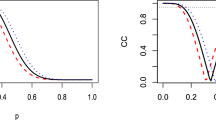Abstract
In this paper I combine the dynamic epistemic logic ofGerbrandy (1999) with the probabilistic logic of Fagin and Halpern (1994). The resultis a new probabilistic dynamic epistemic logic, a logic for reasoning aboutprobability, information, and information change that takes higher orderinformation into account. Probabilistic epistemic models are defined, and away to build them for applications is given. Semantics and a proof systemis presented and a number of examples are discussed, including the MontyHall Dilemma.
Similar content being viewed by others
References
Albers, C.J., 2003, “Distributional inference: The limits of reason,” Ph.D. Thesis, Institute for Mathematics and Computing Science, Groningen.
Aumann, R.J., 1976, “Agreeing to disagree,” Annals of Statistics 4, 1236–1239.
Bacchus, F., 1990, Representing and Reasoning with Probabilistic Knowledge, A Logical Approach to Probabilities, Cambridge, MA: The MIT Press.
Baltag, A., 2000, “A logic of epistemic actions (extended version),” CWI Technical Report, to appear.
Baltag, A., Moss, L., and Solecki, S., 1998, “The logic of public announcements and common knowledge,” pp. 43–56 in TARK 98, I. Gilboa, ed., San Francisco, CA: Morgan Kaufmann Publishers.
Binmore, K., 1992, Fun and Games, Lexington, MA: D.C. Heath and Company.
Blackburn, P., de Rijke, M., and Venema, Y., 2001, Modal Logic, Cambridge Tracts in Theoretical Computer Science, Vol. 53, Cambridge: Cambridge University Press.
de Vink, E. and Rutten, J., 1999, “Bisimulation for probabilistic transition systems: a coalgebraic approach,” Theoretical Computer Science 221, 271–293.
Dempster, A.P., 1967, “Upper and lower probabilities induced by a multivalued mapping,” Annals of Mathematical Statistics 38, 325–329.
Fagin, R. and Halpern, J., 1994, “Reasoning about knowledge and probability,” Journal of the Association for Computing Machinery 41, 340–367.
Fagin, R., Halpern, J., Moses, Y., and Vardi, M., 1995, Reasoning about Knowledge, Cambridge, MA: MIT Press.
Gerbrandy, J., 1999, Bisimulations on Planet Kripke, ILLC Dissertation Series, Amsterdam: ILLC.
Gerbrandy, J. and Groeneveld, W., 1997, “Reasoning about information change,” Journal of Logic, Language, and Information 6, 147–196.
Gillies, D., 2000, Philosophical Theories of Probability, Philosophical Issues in Science, London: Routledge.
Halpern, J.Y., 1991, “The relationship between knowledge, belief, and certainty,” Annals of Mathematics and Artificial Intelligence 4, 301–322.
Halpern, J.Y., 2001, “Lexicographic probability, conditional probability, and nonstandard probability,” pp. 17–30 in Proceedings of the Eighth Conference on Theoretical Aspects of Rationality and Knowledge.
Halpern, J. and Tuttle, M., 1993, “Knowledge, probability, and adversaries,” Journal of the Association for Computing Machinery 40, 917–962.
Harel, D., Kozen, D., and Tiuryn, J., 2000, Dynamic Logic, Foundation of Computing, Cambridge, MA: MIT Press.
Hintikka, J., 1962, Knowledge and Belief, An Introduction to the Logic of the Two Notions, Ithaca: Cornell University Press.
Hirshleifer, J. and Riley, J.G., 1992, The Analytics of Uncertainty and Information, Cambridge Surveys of Economic Literature, Cambridge: Cambridge University Press.
Jeffrey, R.C., 1983, The Logic of Decision, Chicago: University of Chicago Press.
Kolmogorov, A.N., 1956, Foundations of the Theory of Probability, second edition, New York: Chelsea Publishing Company. Translation edited by Nathan Morrison with an added bibliography by A.T. Bharucha-Reid.
Kripke, S., 1980, Naming and Necessity, Oxford: Blackwell Publishers, revised and enlarged edition.
Kullback, S. and Leibler, R.A., 1951, “On information and sufficiency,” Annals of Mathematical Statistics 22, 79–86.
Kyburg, H.E., 1994, “Uncertainty logics,” pp. 397–438 in Handbook of Logic in Artificial Intelligence and Logic Programming, Vol. 3, Nonmonotonic Reasoning and Uncertain Reasoning, D.M. Gabbay, C.J. Hogger, and J.A. Robinson, eds., Oxford: Clarendon Press.
Larsen, K. and Skou, A., 1991, “Bisimulation through probabilistic testing,” Information and Computation 94, 1–28.
Meyer, J.-J. and van der Hoek, W., 1995, Epistemic Logic for AI and Computer Science, Cambridge: Cambridge University Press.
Plaza, J.A., 1989, “Logics of public communications,” pp. 201–216 in Proceedings of the 4th International Symposium on Methodologies for Intelligent Systems, M.L. Emrich, M.S. Pfeifer, M. Hadzikadic, and Z.W. Ras, eds., Oak Ridge National Laboratory.
Prohorov, Y.V. and Rozanov, Y.A., 1969, Probability Theory, Basic Concepts, Limit Theorems, Random Processes, Die Grundlehren der mathematischen Wissenschaften in Einzeldarstellungen mit besonderer Berücksichtigung der Anwendungsgebiete, Vol. 157, Berlin: Springer-Verlag. Translation of Teorija Verojatnostej by K. Krickeberg and H. Urmitzer.
Selvin, S., 1975, “A problem in probability,” The American Statistician 29, 67.
ten Cate, B.D., 2002, “Internalizing epistemic actions,” pp. 109–123 in Proceedings of the NASSLLI 2002 Student Session, M. Martinez (ed.), Stanford University.
van Benthem, J.F.A.K., 2002a, “Conditional probability is update logic,” unpublished.
van Benthem, J.F.A.K., 2002b, “'One is a lonely number': On the logic of communication,” in Proceedings of the Logic Colloquium 2002, to appear.
van Ditmarsch, H.P., 2000, Knowledge Games, ILLC Dissertation Series DS-2000-06, Amsterdam: ILLC. Available online at http://www.illc.uva.nl/Publications/
van Rooy, R., 2003, “Quality and quantity of information exchange,” Journal of Logic Language and Information 12, 423–451.
Veltman, F., 1996, “Defaults in update semantics,” Journal of Philosophical Logic 25, 221–261.
Vos Savant, M., 1990, “Ask Marilyn,” Parade Magazine, p. 15.
Author information
Authors and Affiliations
Rights and permissions
About this article
Cite this article
Kooi, B.P. Probabilistic Dynamic Epistemic Logic. Journal of Logic, Language and Information 12, 381–408 (2003). https://doi.org/10.1023/A:1025050800836
Issue Date:
DOI: https://doi.org/10.1023/A:1025050800836




